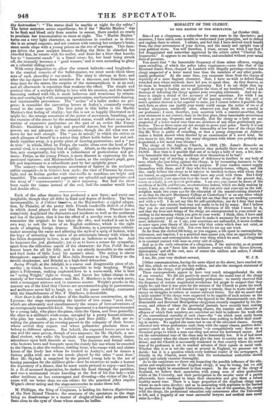Each of the other theatres has produced a new farce;
and every one laughable, though they all differ in kind and degree of drollery. The best, incomparably, is A Cabinet Questi,m, at the Haymarket: a capital adapta- tion, by Planche, of the pretty little French vaudeville Babiole et Joblot, in which Arnal played the part that Buckstone takes. Planche has so completely .Anglicized the characters and incidents as well as the sentiment and fun of the piece, that it has the effect of a novelty even to those who remember the original: he has taken the idea, and worked it out in his own way, to suit the taste of an English audience; which is the right mode of adapting foreign dramas. Buckstone, as a journeyman cabinet- maker assuming the name and affecting the style of a sprig of fashion, with the hope of attracting the notice of an aristocratic beauty with whom he has fallen desperately in love, is an object as ludicrous as needs be. And he humours the jest gloriously; yet so as to leave a corner for sympathy, apart from the ridiculous aspect of the character: for Tom Polish has an honest heart for all his folly, and is not utterly insensible to the smiles and fond looks of little Lucy his master's niece. The acting is clever throughout: especially that of Miss Julia Bennett as Lucy, Tilbury as the servile shopkeeper, and Brindal as a high-bred debauchee.
Seeing Wright, at the Adelphi, is a coarse and disagreeable piece of ab- surdity ; at which, however, it is impossible to help laughing. Wright plays a Policeman, making cupboard-love to a nurse-maid, who is bent on " seeing Wright," right or wrong, and leaves her infant charge in the custody of her voracious adorer; and Mrs. le Matthews is the errant nurse, with a termagant mistress and an amorous master. Wright's pranks in the nursery are of the kind that Clowns are accustomed to play in pantomimes, and audiences never fail to laugh at; and his queer stolidity, contrasted with the blandishments of Mrs. F Matthews, is irresistible.
Next Door is the title of a farce of the double-scene construction, at the Lyceum: the stage representing the interior of two rooms "next door," which are alternately and simultaneously the scenes of love-adventures of an outrageously impossible kind. One apartment is a drawingroom tenanted by a young lady, who plays the piano, visits the Opera, and lives genteelly; the other is a milliner's work-room, occupied by a pretty bonnet-trimmer, who plies her needle, goes to Astley's, and lives jollily. Both are re- calling the pleasures of an evening passed in the company of their lovers; whose arrival they expect, and whose gallantries proclaim them to belong to different spheres. But behold, the expected lovers prove to be one and the same person, though of two manners; for Mr. Skylark, a me- dical student, who walks the hospitals and scampers the streets, dances attendance upon both damsels at once. The decorous and formal suitor, who bestows bows and bouquets upon the stately fair one whom he escorted to the Opera, is also the reckless, rattling lover, who romps with and claims kisses of the lively lass whom he treated to Astley's; and he dances a furious polka with one to the music played by the other " next door." How Mr. Skylark is surprised by the genteel young lady in the act of tossing pancakes for the milliner-girls—how lie contrives to make a bonnet the depository of a dinner, that he must needs pretend to enjoy—and how, in a fit of assumed desperation, he dashes his head through the partition, and sees a sentimental swain kneeling at the feet of his fine lady—with other incidents no less extravagant and diverting—the visiter of the Ly- ceum will see better than we can relate: for the practical jokes require Wigan's clever acting and the stage-accessories to make them tell.


























 Previous page
Previous page